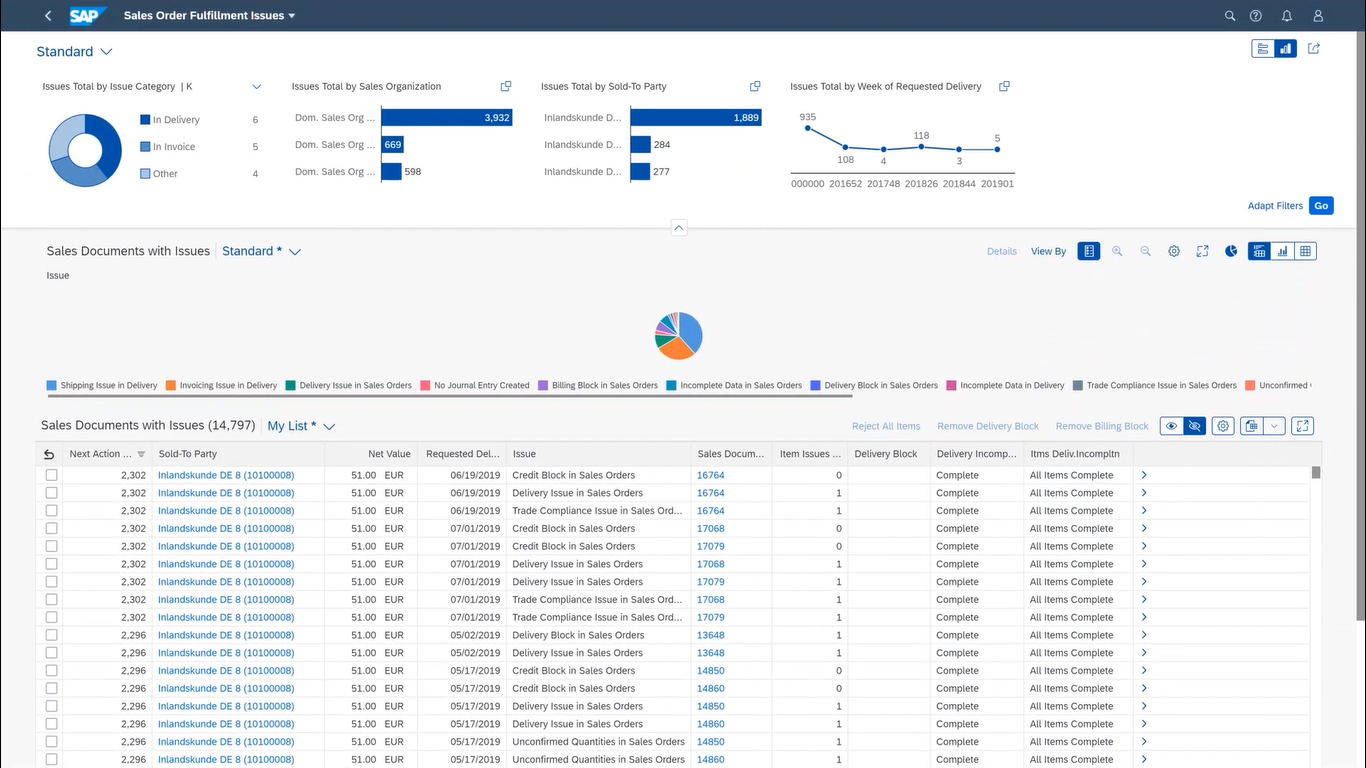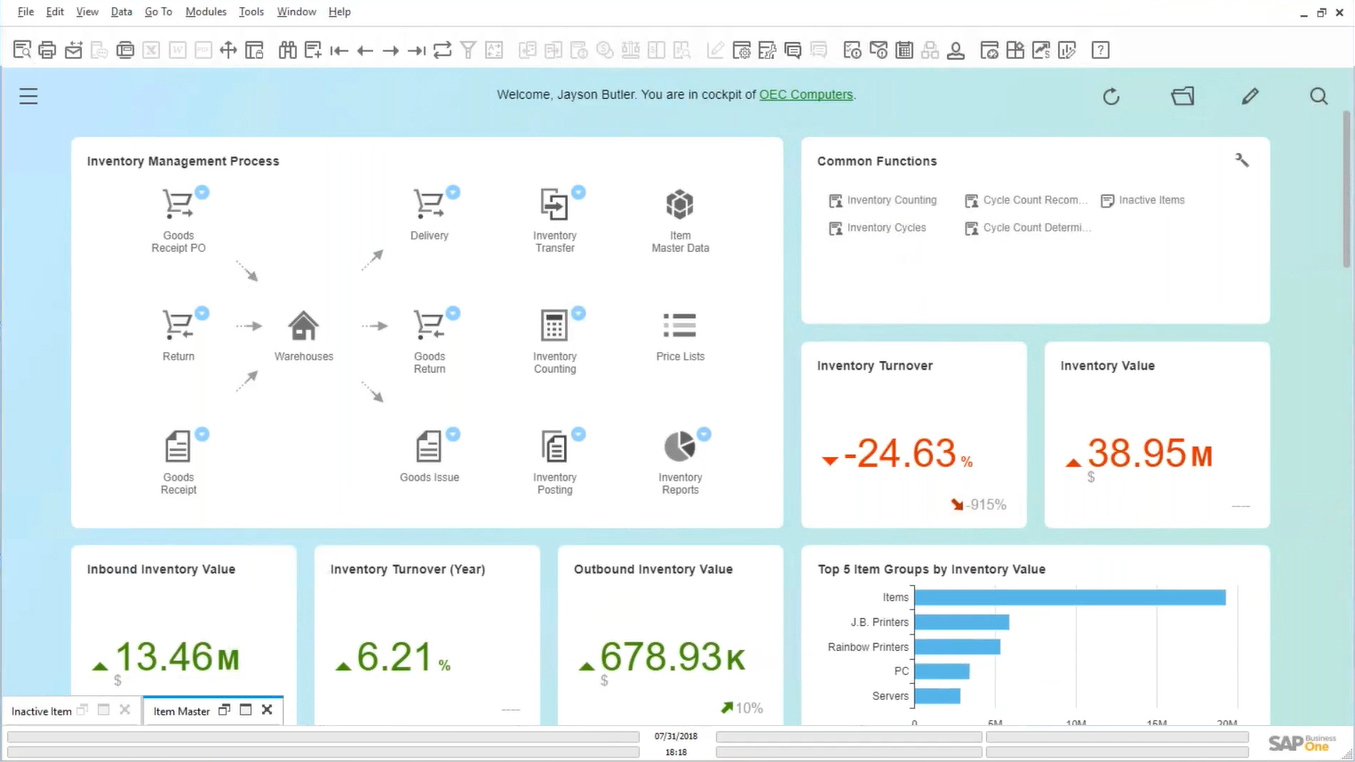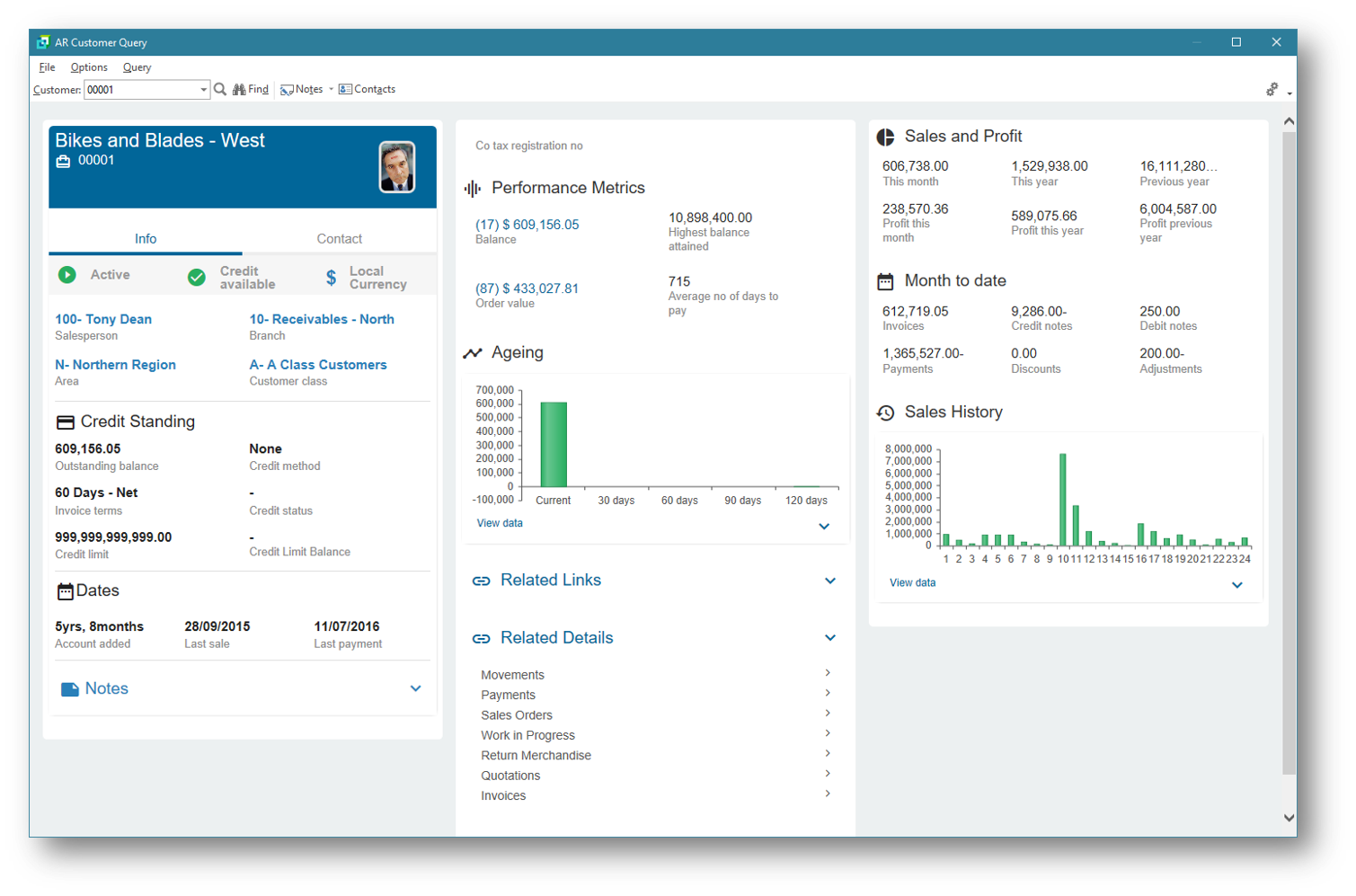Backed by many years of experience, SAP ERP is one of the leading ERP platforms available in the market today. Its comprehensive set of tools will help streamline your operations. Also, it can optimize your efforts to make sure that tasks are finished as planned. However, this system is not without its fair share of shortcomings. So, looking at other ERP software to expand your options makes sense.
To help you with that, we have listed down 10 SAP ERP alternatives. In this analysis of ERP software, we’ll discuss the core functions of each product, plus other essential information, such as integration and pricing. This should aid in your search for suitable options for your operations.
What is SAP ERP?
SAP ERP is a complete enterprise resource planning package with features that include product lifecycle, human capital, and supply chain management. It’s deployable through the cloud or on your servers. It’s even capable of combining those two options to create a hybrid model that gives the advantages of a cloud- and self-hosted solution.
SAP ERP can connect with other SAP products, including SAP HANA, SAP Business Suite, and SAP Ariba. Aside from that, it can also integrate with HR software and payment processing tools. The system is available by-quote, which allows you to avail of its perpetual or subscription license.

SAP ERP is an end-to-end enterprise resource planning system that offers hybrid deployment.
A Costly ERP Suite
The most glaring disadvantage of using SAP ERP is its high cost. Aside from the optional modules to purchase, you also have to think about the cost of installation, implementation, monitoring, and maintenance. This means that you’ll most likely have a dedicated IT team around who oversees the system. Either that or you outsource a consultant that will take care of maintenance and all the necessary repairs.
Implementation might take time as well — maybe a year or two. That’s because most companies will only implement two functions at a time due to its complexity. Additionally, training expenses must also be considered.
While some might think that the cost of a sound ERP system may be too much for them to shoulder. And this is alright. Each company has a set of budget to work with anyway. The good news is that there’s a lot of good SAP ERP alternatives out there that you can avail for a lower price. Here are some of them:
SAP ERP Alternatives
1. NetSuite ERP
NetSuite ERP is a highly-scalable, end-to-end ERP platform for large enterprises and growing organizations. It sports a series of tools for processing finances, orders, revenue, billing, inventory, back-office tasks, and more. It also provides clear KPI views that are especially useful for large organizations. Furthermore, the system offers functionalities for financial management and business intelligence. This gives you the right tools needed to make smarter business decisions.
The system has an extensive connection with third-party apps, including Bronto, Dell Boomi, Epay, ClickSoftware, and more. Aside from those, it can also integrate with other NetSuite products like NetSuite CRM and NetSuite PSA. You can contact the vendor to get a quotation ideal for your business needs.
2. Oracle ERP Cloud
Oracle ERP Cloud is a robust business management solution that can cater to all types and sizes of organizations. It offers tools for project planning, order management, accounting, inventory management, and more. The system’s robust data analysis feature helps perform project assessment, financial analysis, and risk management. Oracle ERP Cloud also features modern best practices to help streamline your enterprise business operations. Designed with scalability and simplicity in mind, the system is capable of automating core processes like financials, reporting, compliance, and more.
As for the pricing, Oracle ERP Cloud offers a simple enterprise packaging structure. It has three plans, which start at $80 per user/month. You can also contact the vendor for more pricing information.
3. Microsoft Dynamics GP
Microsoft Dynamics GP is a CRM solution at its core but also offers a wide range of features for HR, financial, and supply chain management, to name a few. It consolidates all company data and centralizes operations, which dramatically improves the way they’re organized. It’s created with the strength of the well-known MS office software and SQL database to provide you with robust reporting and business intelligence tools. This means that industry benchmarks like market trends and KPIs are easier to evaluate.
The system integrates with a series of third-party solutions that help in different aspects of businesses. These include tools for report building, financial management, manufacturing solutions, and customer relationships. Microsoft Dynamic GP is being sold through ISVs (independent software vendors) so you can request a quote from them. However, the Dynamics GP Hosting fee starts at $134 per user/month.
4. Sage Intacct
Sage Intacct is a cloud-based accounting solution that features capabilities beyond finance management. It’s capable of monitoring inventory levels, performing tax calculations, and even automating workflows. The system is ideal for small and medium scale companies. One of the impressive feats of Sage Intacct is that AICPA recognizes it as its main provider of finance-related apps. This is quite a big deal as it solidifies the reliability of the system’s feature suite.
The system smoothly integrates with other accounting systems as well as other popular tools like Salesforce, Intacct Accounting, and Clarizen. Sage Intacct’s pricing is offered on a quote basis and, thus, you can contact the vendor to ask for a plan tailored to your needs.
5. Odoo
Odoo is an open-source business system that centralizes your organization-wide processes. It houses tools for manufacturing, inventory, project, accounting, CRM, sales, marketing, and more under one platform. This gives you a bird’s eye view of all your operations. It also integrates all the sales channels you have. The software is capable of adapting to both small and large businesses alike.
Odoo can integrate with a plethora of external applications, including marketplaces, payment gateways, document managers, and social media platforms. The software is being sold in various plans, including its community edition that’s available for free. The enterprise edition starts at $20 per user/month.
6. OptiProERP
OptiProERP is an all-in-one, future-friendly solution that has built-in functionalities for industry-specific processes, customer relations, supply chain, and finance. It empowers your business’s growth while staying at a cost-efficient level of pricing. Aside from those, the system also features tools that are created by authorities from the ERP and manufacturing sectors. With this, you can reliably count on the platform for smoothly handling your manufacturing business.
OptiProERP integrates with some popular business applications like MS Azure, AWS, SAP HANA, and Magento. The system is offered in two pricing packages that cater to different sizes of organizations. Both the express and enterprise plans are available by quote.

OptiProERP is an all-in-one ERP solution that offers both vertical and horizontal solutions for businesses.
7. FinancialForce ERP
FinancialForce ERP is a simple but powerful accounting solution that caters to service-oriented companies of any size. It helps streamline the workflows of such organizations while minimizing their expenses. The system is a big help, especially to your financial transactions, as it leverages the power of the Salesforce Accounting tool.
It can directly integrate with Salesforce CRM, which lets your personnel work as one team using only one record system. This provides a higher level of efficiency and consistency between your operations. It can also integrate with third-party applications like ecommerce, POS, and BI tools. FinancialForce ERP uses a modular approach and is available by quote.
8. Epicor ERP
Epicor ERP is a tool that caters to the needs of medium-sized businesses as well as large enterprises. Its ideal users belong to the services, retail, distribution, and manufacturing sectors. The system leverages new technologies, like IoT, big data, and analytics, to provide smart and flexible ERP services to customers.
Epicor features an on-demand data integration software that can connect the clients with their business partners as a service. This way, you will always have apps that are internally provided by Epicor as your business grows. While the system’s pricing starts at $175 per user/month, it has a modular architecture. This means that you can avail of the features that you need and nothing more. Contact the vendor for more details regarding that.
9. Brightpearl
A multi-channel solution for retail management, Brightpearl helps manage inventory, customer data, orders, and accounting in one platform. It facilitates the growth and increase of profits of retailers with multiple channels. The system allows you to acquire reports regarding customer purchase behavior, inventory, cash flow, and more in real-time. Moreover, Brightpearl is equipped with a built-in iOS POS system.
The software integrates with a good number of business applications, including big ecommerce platforms like Shopify, Magento, and Amazon. Brightpearl has a pricing scheme designed for fast-growing and large merchants. You can contact the vendor to get a quotation.
10. SYSPRO
SYSPRO is another one of the extensive ERP platforms out there. Businesses in the manufacturing industries are the ideal users of the system. It features tools to handle order management, inventory tracking, accounting, payment processing, and more. The software also sports integrated supply chain planning, document management, and auditing tools. Furthermore, the system uses machine learning and artificial intelligence to help in analyzing and visualizing company data. This helps in the decision-making processes.
The app integrates with the MS Office suite and other business applications like Web EDI. SYSPRO is only available by quote so you should contact the vendor to ask for pricing details.

SYSPRO gives you numerous customization options.
Choose the Best ERP Software for You
You have now learned about your best bets when looking for SAP ERP alternatives. However, it’s only natural that you make a thorough assessment before proceeding to the next step of investing in one. Therefore, we’ll use this opportunity to give you a short guideline on how to choose the ideal ERP software for your business.
The first thing to consider is usability. This means that the ERP solution you pick must be not only user-friendly for tech-averse users but also flexible for your tech-savvy team members. That said, a platform with both drag-and-drop features and coding options would be nice.
The second factor to look at is scalability. As a business owner, not only should it be your ambition to grow your business, it must also be in your consideration. Thus, you must look for ERP software that can keep up with your growth. This usually means the ability to downgrade or upgrade anytime as needed. Added flexibility can also come from add-ons.
Lastly, you must always look for reliability in ERP software. This means that the system should be capable of accommodating every data you have. It must also run without any lags or crashes. Aside from looking at the software’s perspective, you must also see how reliable the vendors are. Do they provide technical assistance 24/7? Are there reliable FAQs and a knowledge base you can easily access? This will guarantee that your ERP software won’t halt your operations when the system itself experiences trouble.
